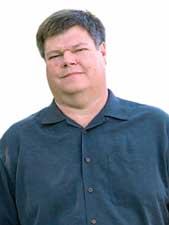Thirty years ago, Steve Bludsworth had no desire for his pool service company to be the biggest or flashiest when he took over the reins from his father. But his willingness to get involved in the industry and its issues, as well as embrace untested, cutting-edge technology, helped make him one of the best.
“We never had a desire to have the most trucks on the road or pools under service,” says Bludsworth, president of All Pool Service & Supply in Orlando, Fla. “We are not interested in customers who are just looking for the cheapest guy.”
His business acumen and insider knowledge of the pool and spa industry has helped make him one of the most respected leaders in the trade.
Personal bests:
Bludsworth has been lauded for his personal involvement in industry issues via his participation in the Florida Swimming Pool Association and APSP. He believes that doing so makes him a better businessman and pool technician, which gives him an edge over the competition.
“I know about things such as the anti-entrapment standards before most do and that gives me an advantage with the customers,” he says. “Knowledge is power.”
In 1997, he was named FSPA’s Person of the Year and elected president the following year. He was also inducted into the trade group’s Hall of Fame. In 1999, he served as chairman of APSP’s (formerly NSPI’s) Service Council and is the current chairman of the FSPA Education Committee.
“We set up the program at the Florida Pool & Spa Show,” Bludsworth says. “There are 60-plus classes, and I had my hand in most of it.”
He also chaired FSPA’s Search Committee. It set out last year to find a new executive director to replace the retiring John Schwartz and eventually selected Nicholas Pasyanos.
Lessons learned:
Bludsworth credits the book The Discipline of Market Leaders: Choose Your Customers, Narrow Your Focus, Dominate Your Market (Perseus Books Group, 1997) by Michael Treacy and Fred Wiersema, for helping him refine his company’s focus.
“It basically says that you can do business at the low-end, mid-range and high-end [market], but you can’t do them all,” he says. “You need to pick one and service those people. This is what we’ve done.
“We don’t try to match the lowest-priced guy out there,” Bludsworth adds. “We want customers to appreciate the quality service we provide.”
As a result of reading the book, he says, “One of the biggest things we have learned to do is to say ‘no.’ You can’t do everything, and you can’t make everyone happy.”
Best business decision made in 2005:
One of the best decisions All Pool Service & Supply made last year redefined its marketing efforts. “We canceled all our Yellow Pagesads,” Bludsworth says. “It eliminates price shoppers.”
The company then shifted its focus. It readjusted its advertising budget toward more direct mail marketing, which he says, “drives the business.”
Best business decision ever made:
Exploring new technologies allows Bludsworth to run a tighter, more efficient ship. He was one of the first in the industry to employ the electronic dispatching of service calls.
The strategy was a radical departure from the “ticket” method that has dominated the pool service business. “Human nature is such that when you are handed a stack of tickets, you might look at them and say, ‘Yea! I got six calls and I can be done by 2 p.m.,’” he says. “Or you might look at them and say, ‘Oh, I don’t feel like fixing a leak today,’ and you skip it.”
Bludsworth’s electronic dispatch system combined with GPS monitoring takes all the decision-making out of field technicians’ hands. Techs are outfitted with special Nextel phones, and the calls are dispatched to them at the start of each day.
“They don’t know where they’re going until they get their first call in the morning and their driving directions,” he says. “We can go into the computer system and see the last time we were [at a client’s house], what we did, what the customer’s dog’s name is and so on.”
All of this ties into warehouse and inventory control, which a majority of service company owners say gives them problems. Bludsworth’s trucks go out each day well-stocked, and his warehouse inventory is constantly monitored and updated. Every part is bar-coded, so managers know which ones have been used and what needs to be replaced.


